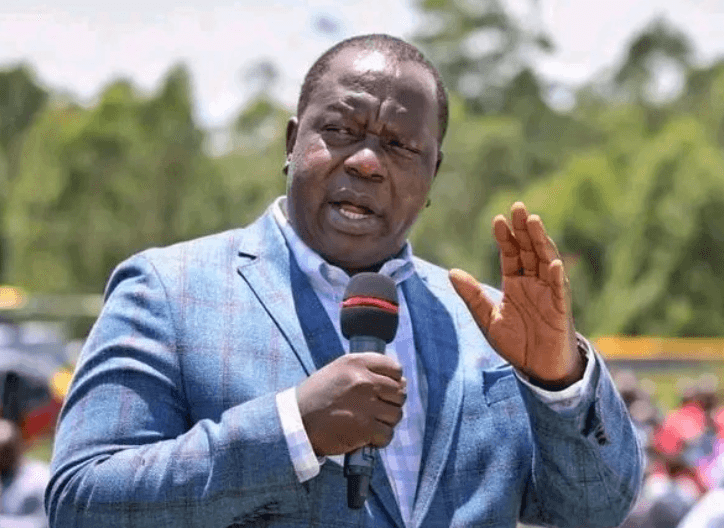We're loading the full news article for you. This includes the article content, images, author information, and related articles.
Former Interior Cabinet Secretary Fred Matiang’i has publicly cautioned President William Ruto’s administration to listen to religious leaders, framing their recent criticisms on governance and economic hardship as the “voice of God” and a reflection of widespread public suffering.

Former Interior Cabinet Secretary Dr. Fred Matiang’i on Saturday, November 15, 2025, issued a stark warning to President William Ruto and his government, urging them to heed the growing chorus of criticism from Kenya's religious leaders. Speaking in Wamunyoro, Nyeri County, during the ordination ceremony for Pastor Dorcas Rigathi, Matiang’i described the clergy as the “conscience of our country” and warned of historical precedents where nations faced turmoil after leaders ignored spiritual counsel.
“I saw a very strong statement from the Conference of Catholic Bishops. The Anglican Church leaders have spoken very loudly, and many of you have spoken loudly,” Matiang’i stated. “I appeal to our national leaders – listen to the clergy. They are speaking on behalf of the people and articulating the pain that ordinary Kenyans are carrying.”
His remarks come just days after a powerful coalition of church leaders, including the Anglican Church of Kenya (ACK) and the Kenya Conference of Catholic Bishops (KCCB), delivered a sharp rebuke to the government. On Thursday, November 13, 2025, the clergy declared Kenya a “sick nation” suffering from poor governance, a punitive tax regime, and a general disconnect between the leadership and its citizens.
The recent pronouncements from the religious bodies detail several key areas of concern. The Catholic Bishops, in a statement on Friday, November 14, 2025, criticized the rushed passage of the Computer Misuse and Cybercrimes (Amendment) Act, citing a lack of sufficient public participation. They also highlighted significant delays in government payments to hospitals under the new Social Health Authority (SHA), warning that these disruptions threaten the delivery of crucial healthcare services nationwide.
Furthermore, the clergy have been vocal about what they see as a failure to address corruption within government institutions and a slow response to national disasters. These criticisms echo a broader public sentiment of economic hardship and governance challenges that have characterized the national discourse throughout 2025. The National Council of Churches of Kenya (NCCK) has previously gone as far as calling on President Ruto to dissolve his cabinet over allegations of incompetence.
Dr. Matiang'i's intervention taps into a volatile political and social climate. Kenya has experienced rolling protests over the past year and a half, largely driven by economic policies, tax hikes, and accusations of police brutality. Public discontent over the high cost of living and unemployment remains a significant challenge for the Ruto administration.
Matiang’i, who has become a more vocal critic of the government, recently accused the administration of fostering “mediocre leadership” and creating an environment of “confusion, chaos and looting.” His comments on Saturday add a significant voice to the opposition's calls for the government to address the public's grievances, which they argue are now being channeled through the country's religious institutions.
The government's response to the clergy has been mixed. While some officials have expressed openness to dialogue, President Ruto has urged all leaders, including the clergy, to be “factual” in their public statements. Prime Cabinet Secretary Musalia Mudavadi, in a meeting with the Inter-Religious Council of Kenya on November 13, 2025, acknowledged the clergy's influential role, particularly in guiding the youth.
The escalating confrontation between the State and the clergy holds significant implications for Kenya's political stability. Historically, religious institutions have played a crucial role as a powerful counterweight to state power, often advocating for political reforms and acting as a voice for the marginalized. By framing the clergy's counsel as a divine warning, Matiang’i is elevating the stakes of the current political debate.
As the government navigates these criticisms, the focus for many Kenyans will be on whether the administration chooses a path of confrontation or dialogue. The warnings from both political and religious leaders suggest a growing impatience among the populace for tangible solutions to the economic and governance challenges facing the nation. The coming weeks will be critical in determining whether the government can mend its relationship with the influential religious community and, by extension, address the widespread discontent they represent.
Keep the conversation in one place—threads here stay linked to the story and in the forums.
Sign in to start a discussion
Start a conversation about this story and keep it linked here.
Other hot threads
E-sports and Gaming Community in Kenya
Active 9 months ago
The Role of Technology in Modern Agriculture (AgriTech)
Active 9 months ago
Popular Recreational Activities Across Counties
Active 9 months ago
Investing in Youth Sports Development Programs
Active 9 months ago